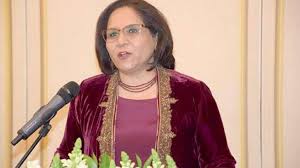CPEC projects to meet deadlines despite novel coronavirus pandemic: Ambassador Naghmana Hashmi

Beijing: Pakistan Ambassador to China, Naghmana Alamgir Hashmi has said that all the projects being completed under the China Pakistan Economic Corridor (CPEC) framework would meet their deadlines as all the preventives and control measures had been put in place against the spread of Covid-19.
“In consultation with the Chinese government and companies, we have put in place a double quarantine system for the Chinese workers returning to Pakistan after the New Year’s vacations to ensure that other workers don’t infected,”she made these remarks while speaking in “World Insight” of China Global Television Network (CGTN). The interview was conducted by one of top and celebrated Chinese anchorperson Tian Wei.
She informed that the first phase of CPEC was almost near to completion as 90 percent of projects were already commissioned and the remaining were only months away from the finishing point.
When the novel coronavirus pandemic happened in China, the government of Pakistan didn’t stop issuance of visa or impose any restriction on travelling between Pakistan and China to ensure that projects were continued and completed on time.
The double quarantine system also worked 100 percent and as a result there was not a single case of coronavirus that went to Pakistan from China and the projects didn’t stop.
Terming the CPEC as an extremely important project for Pakistan, she remarked, “If we need to recover from our economies, it is even more important that this cooperation in the Belt and Road Initiative (BRI) and Special Economic and Industrial Zones doesn’t stop under any circumstance.”
About President Dr. Arif Alvi’s recent visit to China during Covid-19 outbreak, she said that Pakistan and China were all weather friends. Two weeks ago, President Dr Arif Alvi visited China to express solidarity and show the world that both the countries were standing by each others in difficulties and challenges.
“At a time, when there was a lot of politics being played on the new coronavirus and there were very determined efforts by some countries to isolate China, we stood by China. Pakistan did not evacuate its people and we donated our entire stocks of medical supplies to China,” she added.
About medical supplies recently airlifted to Pakistan to help combat Covid-19, she said that this was a combination of some crucial equipments procured and purchased by National Disaster Management Authority (NDMA) of Pakistan but overwhelming tonnage of the equipment and supplies consisted of donations made by the Chinese companies and friends.
“It is great satisfaction for me to tell you that donated items have a value of RMB 25 million and it is very huge contribution made by the Chinese friends,” she added.
Ambassador Hashmi said that some of the items included crucial testing kits, X-ray machines and other lot of equipment. It also included a reasonable amount of traditional Chinese medicines.
“It is a huge help and this is not only one flight that we are operating. A lot of our Chinese friends have promised for many more donations. We are very grateful to our Chinese brothers and sisters,” she added.
Terming the current outbreak huge challenge, she said that Pakistan was a developing country and there were large areas in the cities and villages where poverty still existed while the population was not 100 percent literate.
Under the prevailing circumstances, the government had so far done quite well. It had allowed local business under strict regulations to open up for certain number of hours every.
The government also announced economic package to support the small and medium enterprises besides directly supporting the families and individuals who depend on daily wages.
Prime Minister Imran Khan had also formed a youth tiger force against coronavirus to create social awareness and to provide food and ration on daily basis to families who depends on daily wages, she added.
Ambassador Hashmi said that the government also involved the Islamic scholars who come up with advice in the light of the religion on virus controls.About the shortage of testing kits, she informed that the entire population could not be tested with 50,000 testing kits because Pakistan was a country of over 230 million people and most of them were living in remote areas.
“So learning from the Chinese experience, we are also employing the same method. And we are very closely monitoring the patient or population that is showing signs of coronavirus. If he or she tests positive, we trace the people who have been contact with him or her in last 40 days and put them in self quarantine,”she added.
“We will have to take the methodical approach which China adopted that is the only method which is feasible.”
Regarding lesson from China’s heath advisers, she responded that it was not only Pakistan but the entire world had learned from China. “We are also very carefully analyzing the practices of Chinese government, hospitals and doctors.”
The embassy was summarizing and transmitting all that material to the relevant authorities back home. “At this moment, our country needs us and each member of my embassy has risen to the challenge and we are working round the clock.”
Ambassador Hashmi said, “We started the awareness programme well before the epidemic and cases of coronavirus started coming to Pakistan.”As a large number of Pakistan community including 28,000 students, of which 1300 students were concentrated in Hubei and about 1186 in Wuhan evoked a lot of interest back in the general public and students.
In the beginning, they were very worried and they wanted to be repatriated. The embassy and government was consistently engaging with the public on media about what China was doing and what steps China was taking to ensure the Chinese people as well as foreigners particularly the Pakistani people being kept safe.
They were again and again urging that this virus situation could hit any country. So in Pakistan also, we should be aware to how to deal with it. When it came to Pakistan, general public to a large extent was already aware about the disease.
“This awareness gave our doctors and institutions to print out and prepare a lot of videos and written material which they circulated to the general public to create awareness that helped us in big way,” she added.
On temporary hospitals, she said that Pakistan had done exactly that China had done. For remote areas where 70 percent population existed, the government had even converted rail coaches into temporary isolation units.
“We are also converting a lot of our government buildings and schools to reduce the pressure on the hospitals. We have asked our retired doctors and nurses to come and work as volunteers. We are also trying to monitor residential areas and people as well to identify the patients.”





